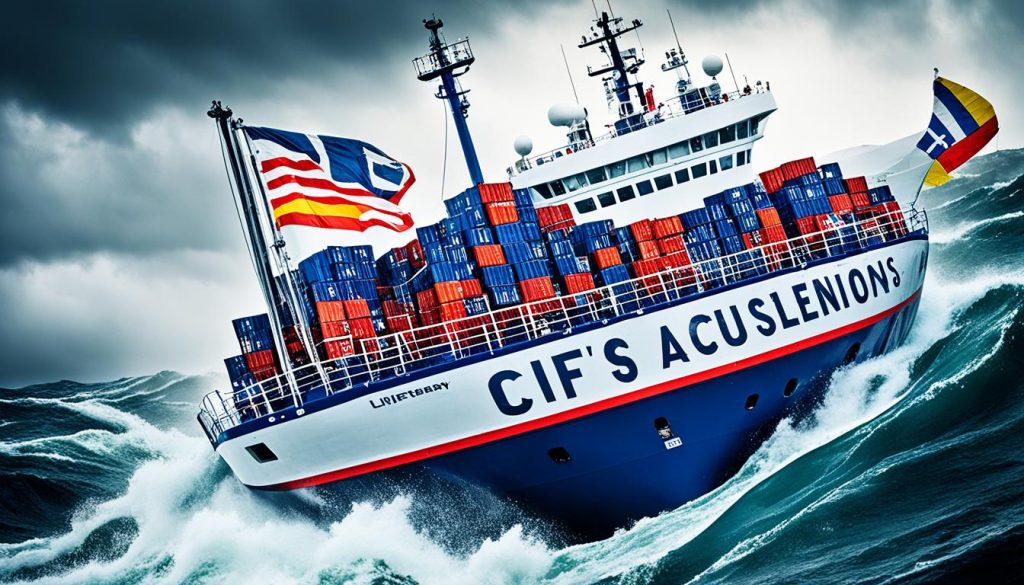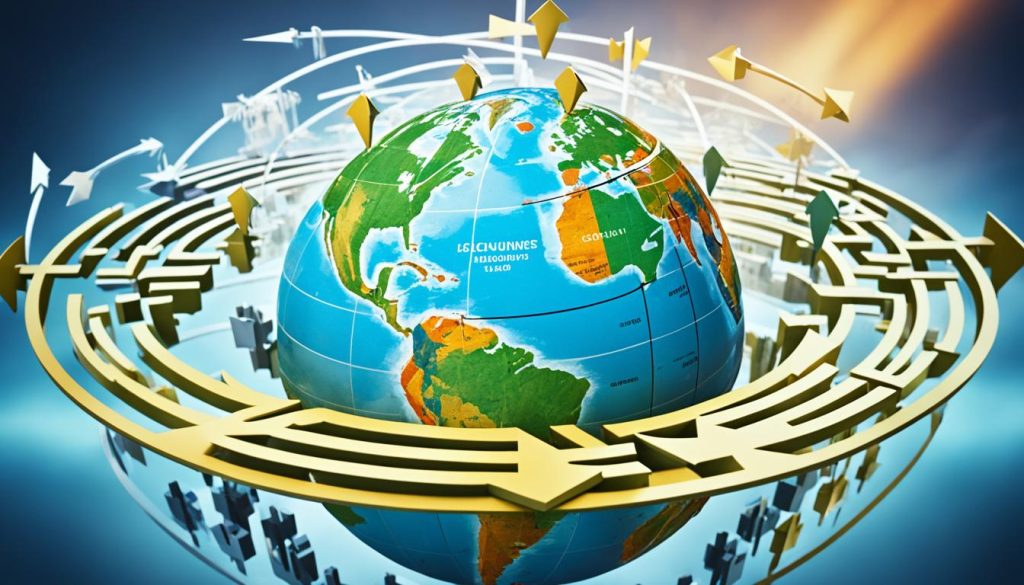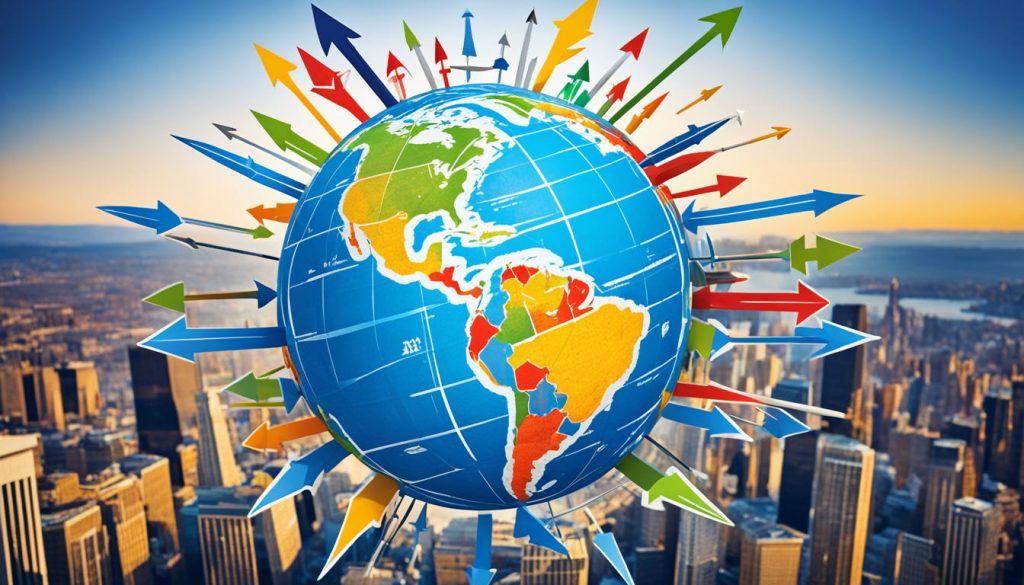In the modern world, companies are going global to expand. They aim to reach new customers and enter new markets. Brands like Nestlé, Unilever, and Toyota have grown by using such strategies.
These companies gain more by operating in different countries. They see a chance for more sales and spread out their business risks. This way, they can use local resources better and come up with new ideas.
Key Takeaways
- Multinational corporations benefit from tapping into new consumer bases.
- Global expansion helps businesses acquire emerging markets.
- Significant market shares can be achieved through international business strategy.
- Brands like Nestlé, Unilever, and Toyota have successfully leveraged multinational strategies.
- Becoming multinational allows for revenue generation, risk diversification, and resource optimisation.
Market Expansion: Tapping into New Consumer Bases
Growing a consumer base across international markets is key for big companies. They have to understand customer trends in each area to break through successfully.
Understanding Target Markets
The first move is getting to know your market. It’s all about diving into who your customers are. Age, gender, income, and culture matter a lot. Knowing this lets companies make products that really click with local customers.
Localisation Strategies
Localisation means tweaking products and services for different international customers. This could be translating words, changing cultural elements, or altering products. Take Starbucks as an example. They mix up their menu to suit each place’s likes, helping them fit in and sell more.
Gaining Competitive Advantage
To win over international markets, companies must get local tastes right and use strong localisation strategies. If they can meet local needs better than nearby rivals, they’re more likely to succeed and grow in that area.
| Company | Localisation Strategy | Market Penetration Impact |
|---|---|---|
| Starbucks | Customised menu for local tastes | Increased customer loyalty and sales |
| McDonald’s | Localised menu items (e.g., McAloo Tikki in India) | Enhanced market presence and brand recognition |
| Coca-Cola | Targeted advertising based on cultural values | Boost in market penetration and consumer engagement |
Cost Reduction: Economies of Scale
For big companies that work worldwide, finding ways to cut costs is key. They do this by making their operations bigger and better. This helps them save money and work more efficiently.
Manufacturing Efficiency
Improving how things are made is a top way to save. Companies like Apple work with partners all over to make their processes smoother. This means they can make more goods at a lower cost per item.
When companies make more goods, they use less money for each item made. This is because their costs for materials don’t go up as much. It’s a smart move for any global company.
Lower Labour Costs
Some countries have lower costs for workers, which helps companies save money. By making goods in these places, companies can keep making lots without spending too much.
This strategy lets businesses keep their prices competitive. It also helps them stay strong in the market. They can sell more and keep growing.
Diverse Investment Opportunities
Companies going global can invest in a wide range of areas. This lets them find unique projects and markets not seen at home. By investing worldwide, they can spread their risks and increase their profits. For example, Google has put money into new tech markets, showing how big companies find different investment chances.
International markets bring many benefits for investment strategies. By putting money in various parts of the world, companies depend less on their home markets. This means they’re better protected if a single market goes down. Investing in different assets and places can make earnings more stable and possibly higher.
Multinational companies gain an edge by exploring new sectors and technologies. They can be pioneers in fresh markets and advanced technologies. By matching their investments with global trends, they stay in front of their competitors. This approach makes diverse investments very important in today’s global economy.
Risk Diversification

Companies working internationally can spread their risks over many markets. This helps lessen the blow of economic slumps in any one place. By doing so, they improve how they manage risks, offering protection against unpredictable market changes.
Mitigating Market Volatility
Market volatility is a big challenge for businesses. By being in different markets, companies can deal with sudden economic changes better. Diversification is key to strong risk management.
Currency Exchange Hedging
For global companies, it’s vital to protect against exchange rate changes. Good currency hedging keeps them strong despite financial ups and downs. This stability helps them maintain steady financial results.
Political Stability Considerations
Political risks matter a lot for international business. It’s important to look at political stability before entering new markets. Big oil companies like BP handle political risks smartly. They protect their assets and keep operations safe from political trouble.
Access to Skilled Labour
Multinational corporations (MNCs) benefit greatly from accessing a wide talent pool. Firms such as Microsoft and Unilever draw from global skills to stay innovative and ahead. They find and hire specialised experts from around the world, fostering a lively and creative work environment.
Building Global Talent Pools
MNCs create global talent pools to streamline their HR strategies worldwide. This diversifies their workforce and secures specialised skills needed for growth. It allows teams from various countries to work together, sharing unique abilities and boosting the company’s knowledge base.
Implementing Effective Training Programmes
Effective training is key to developing a skilled workforce. Siemens, for example, has launched advanced training for its teams across different countries. These initiatives boost employee skills, ensuring efficiency. This uniform excellence in service is crucial for a strong brand and sustained expansion.
Innovation and R&D Activities
Innovation and R&D are key for multinational companies to stay ahead. By working with global partners, these companies can expand their innovation horizons. This also speeds up new technology development.
Such efforts often lead to major breakthroughs in many areas. These advances benefit not just the company but also the wider market.
Collaborating with International Research Institutions
Working with international research institutions boosts a company’s R&D. It creates a space where pooling of resources and knowledge happens. This way, multinationals can achieve much more than on their own.
For example, companies like Pfizer have seen faster drug development through global partnerships. This has made new treatments quickly available around the world.
The table below shows key pharmaceutical innovations from such partnerships:
| Company | Research Institution | Innovation Outcome |
|---|---|---|
| Pfizer | BioNTech | mRNA COVID-19 Vaccine |
| GlaxoSmithKline | Bill & Melinda Gates Foundation | Malaria Vaccine |
| Roche | Genentech | Oncology Treatments |
| AstraZeneca | University of Oxford | COVID-19 Vaccine |
Strategic Asset Acquisition
Multinational corporations (MNCs) often buy assets to get valuable resources. These include intellectual property and patents. Doing so, they boost their market presence and get ahead of rivals.
Intellectual Property and Patents
Getting intellectual property and patents is crucial. They make a company more influential and protect it from competition. They also open new ways to make money. For example, SoftBank bought Arm Holdings to enhance its position through Arm’s intellectual wealth.
Resource Acquisition
Getting the right resources is key for MNCs. They aim to secure natural resources to make their supply chain reliable and efficient. This helps keep operations running smoothly and cuts costs. It’s vital for staying competitive globally.
| Company | Acquisition | Benefit |
|---|---|---|
| SoftBank | Arm Holdings | Increased market influence through intellectual property |
| Royal Dutch Shell | BG Group | Resource acquisition for stable supply and cost optimisation |
| Motorola Mobility | Enhanced intellectual property and patents |
Enhancing Brand Recognition
For multinational companies, going global is a golden chance to boost their brand’s value. This move ensures their brand becomes known and trusted worldwide. Coca-Cola is a prime example of this success, with its name known everywhere, winning customer loyalty and trust.
Getting international fame needs a solid global branding plan. It not only improves the brand’s value but also makes a company stand out in tough markets. Here’s a table showing what companies achieved with top-notch global branding:
| Brand | Global Reach | Customer Loyalty |
|---|---|---|
| Coca-Cola | 200+ Countries | High |
| Apple | 175+ Countries | Very High |
A strong global branding strategy leads to worldwide recognition. This means more market share and stronger brand value. In the end, it’s the well-known brands that keep winning, thanks to loyal customers all over the globe.
Why would a company become multinational?
A company might go multinational to grow bigger and reach more customers. They see other places with high demand for what they sell. By moving into these new markets, they can sell more and make more money.
They also want to save money on making their products. By operating in different countries, they can make things cheaper. This helps them stay competitive globally.
Being multinational also means they can invest in different economies. This diversifies their investments, reducing risks like market changes or currency issues. It’s a way to protect the business from unexpected problems.
Another plus is getting access to talented workers from everywhere. This global team brings in new ideas and innovation. Companies train these workers to keep their edge sharp.
Lastly, becoming a big global brand boosts the company’s image. It builds trust with customers everywhere. And it strengthens their position in the international business world.
This part repeats earlier information, so we’re skipping it to avoid repetition. Still, these reasons show why companies aim to go global. They’re looking for growth, innovation, and stability.
Leveraging Financial Resources
Multinational corporations (MNCs) grow by entering global markets, gaining more financial resources. This step is crucial for growth and staying ahead in today’s world.
Access to Global Capital Markets
MNCs enjoy the benefit of reaching into global capital markets. This gives them a wide range of investors, helping to gather funds. Capital markets offer them financial flexibility and open doors to more funding. This is vital for going global and bringing new ideas to life.
International Banking Facilitation
International banks are key to easy global business dealings. For example, HSBC’s huge network helps MNCs seize financial chances worldwide and tackle financial challenges. T
hese banks offer crucial support and tools for managing money across borders. They make financial operations smoother and strengthen financial health.
Cultural Competency Development
In today’s world, big businesses must master cultural competency. This skill helps them work well across different cultures and boosts their ability to manage globally. Training in cross-cultural management is key to understanding different cultures.
Cross-Cultural Management Training
Big companies like IBM invest in training to understand various cultures better. This ensures they work smoothly worldwide. Such training teaches about different customs and values. It’s crucial for success in global management.
Improving Communication Skills
Good communication is essential for cultural competency. It helps bridge cultural differences and creates an open workplace. Firms use language classes and workshops to improve these skills. The aim is to make sure people from different cultures work well together.
Tax Optimisation Strategies

Companies aim for multinational status to save on taxes. They navigate through different tax laws to save money. Apple is a great example of using different places to lower its taxes.
Businesses reduce their taxes by using strategies like delaying tax payments. They also benefit from lower taxes in some areas. All this is done within the law.
Here are some methods multinationals use:
- Using low tax rates in some places
- Delaying taxes
- Pricing goods and services well between company divisions
- Using tax agreements between countries
Let’s look at tax rates and strategies in various countries:
| Country | Corporate Tax Rate | Common Tax Strategies |
|---|---|---|
| Ireland | 12.5% | Holding company setups, managing intellectual property |
| Netherlands | 25% | Setting prices for internal group transactions, getting tax rulings |
| Singapore | 17% | Incentives for regional HQs, intellectual property management |
| United Kingdom | 19% | Lower taxes on patent incomes, research and development tax credits |
| Advantage | Description | Example |
|---|---|---|
| Knowledge Sharing | Partners can share expertise and technologies, resulting in innovation and enhanced product offerings. | Renault-Nissan-Mitsubishi Alliance |
| Market Penetration | Collaborations allow easier access to new markets and local customer insights. | Starbucks and Tata Alliance in India |
| Resource Optimisation | Pooling resources reduces costs and increases efficiency in production and distribution. | Boeing and Rolls-Royce partnership |
Leveraging strategic alliances is essential for international success. By entering these partnerships, companies can improve their position in the market, keep innovating, and manage the challenges of global growth more smoothly.
Regulatory Environment Navigation
MNCs face tough challenges in following different country’s rules. They need to know international laws and environmental policies to run smoothly. This knowledge helps them avoid big fines, legal issues, and harm to the environment.
Understanding International Compliance
International laws change often. Firms need to understand and apply these rules well. They should keep an eye on trade, taxes, and worker rights everywhere they work.
Creating a team focused on compliance helps. This team watches for law changes and adapts the company’s actions. Being committed to following the rules builds trust with people involved.
Adhering to Environmental Standards
It’s vital for MNCs to follow environmental policies to show they care about being sustainable. Companies like Philips lead by example, meeting tough environmental requirements. Using green processes and cutting carbon emissions boosts their standing and meets global goals.
Working with local groups helps MNCs follow area-specific environmental laws. This collaboration is key for effective compliance.
Infrastructure and Technology
For multinational corporations, it’s vital to invest in technology infrastructure. This move aims to make operations smoother and boost productivity. By adopting the latest IT systems and manufacturing technology, businesses can get better at handling tasks and communicating worldwide.
Investing in Global IT Systems
Global IT systems form the core of today’s business world. They help with organizing data, staying connected, and making processes automatic. When MNCs pour funds into IT investment, they’re making sure teams and resources worldwide work together well. Companies like General Electric are prime examples of this, showing how crucial these investments are.
Adopting Advanced Manufacturing Technologies
Using advanced manufacturing technology is key to innovation in making things. It leads to better product quality, quicker production, and lower costs. Integrating machines that work on their own and intelligent manufacturing systems helps companies boost what they can make. It also cuts down on mistakes and saves on materials.
- Enhances product quality
- Speeds up production processes
- Reduces operational costs
- Mitigates errors and resource wastage
| Key Elements | Benefits |
|---|---|
| Global IT Systems | Efficient data management and communication |
| Manufacturing Technologies | High-quality production, faster processes |
Customer Service Enhancements

Multinational companies focus a lot on bettering customer service for global customers. They use modern technology to offer help any time, day or night. This is key to keeping service top-notch and customers happy. They also use feedback to keep improving and meet what customers expect. Amazon is a shining example of doing this right.
24/7 Support Availability
Nowadays, people want help right away, no matter the time. Companies giving around-the-clock support make sure customers get the help they need quickly. This builds better service and loyalty. Offering help through chat, email, and phone keeps companies ahead of the game.
Implementing Customer Feedback Systems
Hearing from customers is vital for making services better. By collecting and analyzing input, businesses spot what needs work. They then make the necessary changes. This boosts happiness with their services. Using surveys, reviews, and direct feedback helps gather these insights. It helps companies keep up with changing tastes and build lasting trust and loyalty.
Social Responsibility and Sustainability
The world is now focusing more on ethical business. Multinational companies (MNCs) are taking this seriously and making big changes. They are putting social responsibility at the heart of their plans. This is because they know their role is essential in solving world problems.
Take IKEA as an example. They’ve got a plan called People & Planet Positive. It’s a big part of their business. They choose renewable resources and work on lowering their carbon emissions. This doesn’t just make them look good. It also draws in customers who care about these issues.
By following the United Nations’ Sustainable Development Goals, companies show they are reliable and have a future-focused outlook. They tackle big issues like climate change and social inequality. This makes them stand out as ethical leaders. It also helps build a strong, trusting relationship with everyone who deals with them.
















